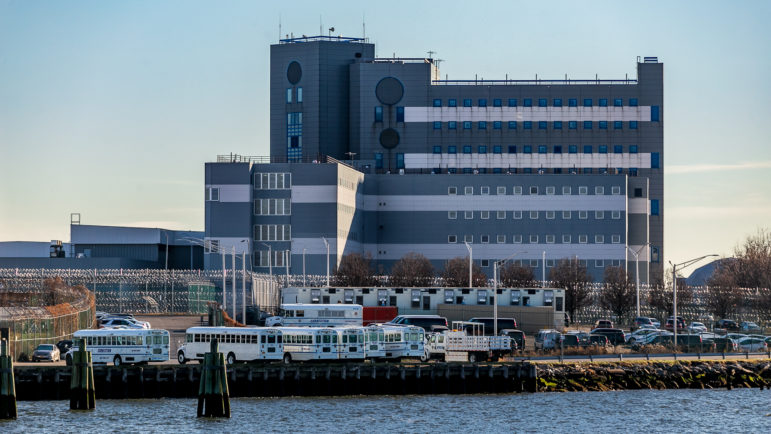So far, New York State has allowed the city to administer the vaccine only to the highest-risk patients behind bars, only about 100 people as of last week, according to one Correctional Health Services’ official.

Adi Talwar
Rikers Island.City officials are pushing for state approval to vaccinate people in city jails against COVID-19, citing the extra risks posed to those in correctional facilities. So far, New York State has allowed the city to administer the vaccine only to the highest-risk patients behind bars, only about 100 people as of last week.
Officials with Correctional Health Services, a division of NYC Health + Hospitals that administers healthcare to people in custody, said during a Board of Correction meeting last week that it had so far been able to offer the COVID-19 vaccine to 497 of the eligible highest-risk patients in city jails, and about 100 had actually been vaccinated as of Jan. 12. The agency had secured state approval to vaccinate those patients on Jan. 6 after arguing that, based on their health conditions, these patients would be “clinically analogous to residents of facilities the state had approved for vaccination” such as nursing homes, according to Patsy Yang, senior vice president for CHS.
Yang noted that New York City is the only jurisdiction within the state that has vaccinated people in custody at all, reflecting concerns criminal justice advocates have repeatedly raised about the lack of clarity and decisive action from the state to ensure people behind bars get prioritized for vaccination. Advocates say prioritized access would help protect people in jails and prisons from COVID-19, which is more dangerous in congregate settings, where the virus spreads more easily.
“We continue to advocate that all our patients should be eligible to be offered the vaccine, not necessarily because of their health status, but because of the nature of the congregate setting,” Yang said during last week’s public meeting. “We have not yet received that approval, but we will continue to argue for it.”
There were nearly 5,000 people in city jails as of Jan. 1, up from an historic low of 3,832 in April, according to the Board of Correction.
Jonah Bruno, director of public information for the state’s Department of Health, declined to clarify when others in jails (aside from the sub-group of higher risk individuals) and those in state prisons will get access. The state expanded its vaccine eligibility criteria to phase 1b on Jan. 11, which includes New Yorkers over 75 and certain groups of essential workers, including corrections officers.
“Among those included in Phase 1b vaccination are DOCCS personnel, including correction and parole officers, who can begin signing up for the vaccine,” Bruno said in a statement via email. “DOCCS is still working with DOH to develop a plan, as part of the New York State COVID-19 Vaccination Program, for the incarcerated population.”
Both city and state officials have been working to speed up New York’s overall vaccination rollout in recent weeks, after a sluggish start last month. Mayor Bill de Blasio said Tuesday that New York City has administered 455,737 doses in total, and had only 116,000 doses left to last the week, with another round of supplies not expected to arrive until next Tuesday.
The mayor urged the federal government to deliver more doses to New York, otherwise the city could run out as early as Friday.
“Right now it is up to the federal government, it is up to the state, it is up the manufacturers to do everything they can to get us the maximum supply,” de Blasio said, adding he is “very hopeful” things will speed up after the Biden administration takes office on Wednesday. President-elect Joe Biden has said he plans to administer 100 million vaccine doses in his first 100 days.
Nicole Javorsky is a Report for America corps member.









